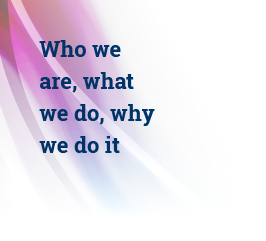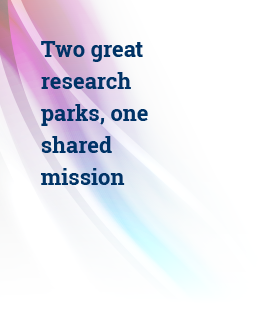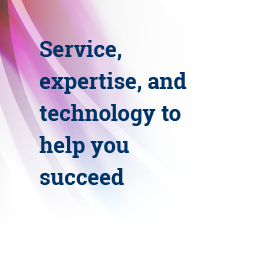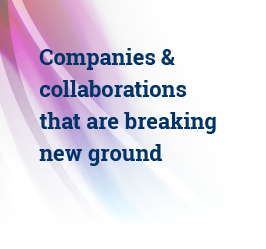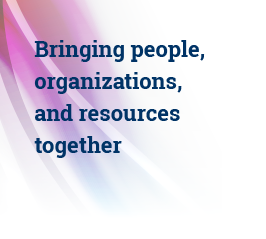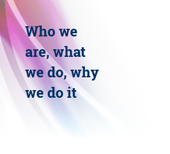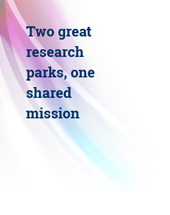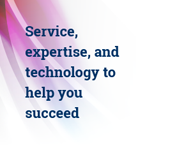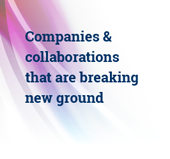Center for Innovation Mentors Startups
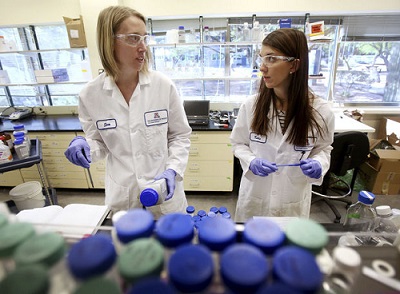
DemeteRx Pharmaceuticals co-founders Samantha Whitman, left, and Katie Bliss work in the wet labs of the Arizona Center for Innovation. Whitman says the center’s shared wet lab helps startup companies lower their costs by giving them access to equipment that can cost $10,000 and $20,000.
Yi-Chang Chiu remembers what he was thinking when he was founding Metropia, a technology company that grew out of his University of Arizona research.
After working with the UA’s Office of Technology Transfer to create a prototype and file a patent, “The first question that came to me was ‘OK, I’m a professor, I have absolutely no idea what you’re talking about in terms of setting up a company,’” Chiu said.
“I had zero experience raising capital, hiring employees, developing a business plan. Those kinds of things were over my head.”
He turned to the Arizona Center for Innovation to help develop his company, which aims to improve traffic and transportation through an app.
The Arizona Center for Innovation, a business incubator also known as AzCi, is a component of the UA Tech Park.
AzCi broadened its focus last year to make its resources available to companies at all stages — from early-stage startups to emerging companies. Since then, the center has seen a slight increase in clients, which is expected to grow in the next year or two, said Bruce Wright, associate vice president of Tech Parks Arizona, and Anita Bell, acting director of the Center for Innovation.
Wright said the center complements the work of enterprises such as Startup Tucson and Connect.
“The so-called entrepreneurial ecosystem in Tucson has grown and matured dramatically over the last four or five years,” Wright said, and Justin Williams, chairman and CEO of Startup Tucson, agrees.
FACILITIES AND EQUIPMENT
AzCI offers access to facilities, laboratories and expertise.
“We’re a biotechnology company, and space for that in Tucson outside of the university is limited,” said Samantha Whitman, co-founder and administrative director of DemeteRx Pharmaceuticals, a company that is currently a client of the center, at Rita Ranch in southeast Tucson.
Whitman said the center’s shared wet lab facility with a collection of core equipment helps startup companies lower their costs by giving them access to pieces of equipment which can cost between $10,000 and $20,000.
“Having access to that space and equipment before we even got started off the ground was a huge advantage,” Whitman said.
The center also offers other services that might seem mundane — such as conference rooms and copy machines — but their availability allows companies to focus on their product and not have to worry about what Wright calls “business infrastructure elements.”
There are 12 standard modules in AzCI’s Mentored Launch program, but mentors also meet with companies weekly to provide a more customized program.
“The best part of this experience was getting to know my advisor, Corey Smith,” said Chiu, the founder and CEO of Metropia. “He has such a vast amount of corporate knowledge and was the entrepreneur in residence so he mentored all of the companies.”
Metropia was an AzCI client for about a year.
One workshop Chui remembers in particular trained entrepreneurs on how to pitch their ideas under varying time constraints — 3 minutes, 2 minutes and 90 seconds.
“It was so hard for me because as a faculty member, I’m mentally programed to speak for 75 minutes,” Chiu joked.
Since graduating from the program, Metropia has raised a couple million dollars in capital, hired around 20 employees, and has offices in Tucson, Austin, New York and Taipei. Metropia recently launched in Tucson and has launches planned in Austin in May and New York in June.
COMMUNITY ENVIRONMENT
Companies say another advantage to working with an innovation center is the interaction with others going through the startup process.
“If you’re working on something by yourself and you’re not getting any outside input, it might seem like a super great idea to you and then you might run it by someone else and they’re like, ‘What are you talking about?’ ” said Steve Bernat, founder and CEO of Rally Up.
Rally Up is a website aimed at making fundraising easier. Bernat was inspired to create it after working with junior high school students in a youth group, experiencing the hassle of fundraising and realizing that there was nothing on the market that addressed this issue.
MEASURING SUCCESS
The biggest measure of success is five years afterward if the company is still in business, selling products, creating jobs and creating revenue to share with shareholders, Wright said. “But it’s more complicated than that.”
Not all technologies are destined to be commercialized and turned into a company. AzCI helps to determine if the product has commercial value, and if it should be licensed to an existing company or vested in a startup company. The center has a rigorous application process with a review committee.
The innovation center has had more than 90 companies cycle through its programs over the last 12 years. It’s working on tracking down all of these companies to see what they’re doing. The last time the center took this measure was about a year and a half ago, and it found a 68 percent success rate.
The overall failure rate for new U.S. companies is about 80 percent, Wright said. However, the national average for companies that go through an innovation center is about 80 percent success, he said.






